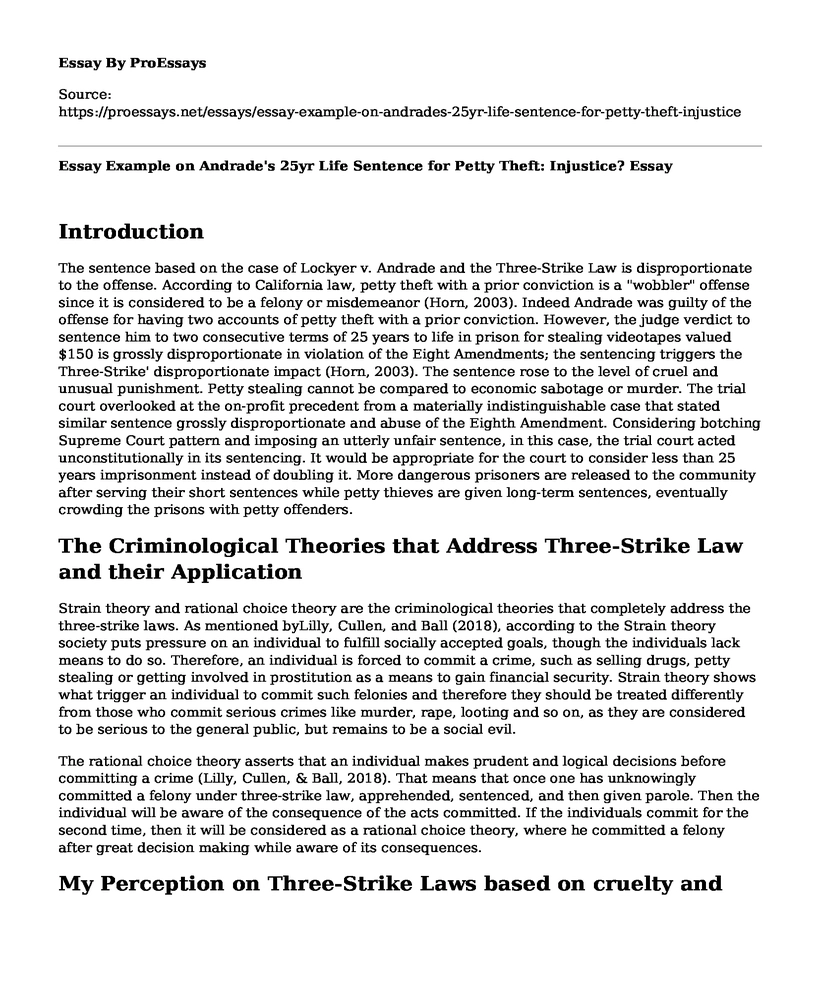Introduction
The sentence based on the case of Lockyer v. Andrade and the Three-Strike Law is disproportionate to the offense. According to California law, petty theft with a prior conviction is a "wobbler" offense since it is considered to be a felony or misdemeanor (Horn, 2003). Indeed Andrade was guilty of the offense for having two accounts of petty theft with a prior conviction. However, the judge verdict to sentence him to two consecutive terms of 25 years to life in prison for stealing videotapes valued $150 is grossly disproportionate in violation of the Eight Amendments; the sentencing triggers the Three-Strike' disproportionate impact (Horn, 2003). The sentence rose to the level of cruel and unusual punishment. Petty stealing cannot be compared to economic sabotage or murder. The trial court overlooked at the on-profit precedent from a materially indistinguishable case that stated similar sentence grossly disproportionate and abuse of the Eighth Amendment. Considering botching Supreme Court pattern and imposing an utterly unfair sentence, in this case, the trial court acted unconstitutionally in its sentencing. It would be appropriate for the court to consider less than 25 years imprisonment instead of doubling it. More dangerous prisoners are released to the community after serving their short sentences while petty thieves are given long-term sentences, eventually crowding the prisons with petty offenders.
The Criminological Theories that Address Three-Strike Law and their Application
Strain theory and rational choice theory are the criminological theories that completely address the three-strike laws. As mentioned byLilly, Cullen, and Ball (2018), according to the Strain theory society puts pressure on an individual to fulfill socially accepted goals, though the individuals lack means to do so. Therefore, an individual is forced to commit a crime, such as selling drugs, petty stealing or getting involved in prostitution as a means to gain financial security. Strain theory shows what trigger an individual to commit such felonies and therefore they should be treated differently from those who commit serious crimes like murder, rape, looting and so on, as they are considered to be serious to the general public, but remains to be a social evil.
The rational choice theory asserts that an individual makes prudent and logical decisions before committing a crime (Lilly, Cullen, & Ball, 2018). That means that once one has unknowingly committed a felony under three-strike law, apprehended, sentenced, and then given parole. Then the individual will be aware of the consequence of the acts committed. If the individuals commit for the second time, then it will be considered as a rational choice theory, where he committed a felony after great decision making while aware of its consequences.
My Perception on Three-Strike Laws based on cruelty and Unusual Punishment and the public view on the Law on the Criminal Justice System
I believe that the Three-Strike law (Three Strikes) is cruel and unusual punishment. The Three-Strike law has led to an increase in the number of inmates in the prisons leading to overcrowding. There is public pressure, urged by the fear of having violent criminals being released, then committing similar crimes again against the community, while those who commit petty crimes such as stealing a $20 bottle of vitamins or shoplifting a single magazine is being sentenced for life. The Three-Strike law is bias and affects the correctional facilities by sending offenders to incarceration on issues that can be handled through probation or by psychological support.
References
Horn, D. (2003). Lockyer v. Andrade: California Three Strikes Law Survives Challenge Based on Federal Law That Is Anything but Clearly Established.
J. Crim. L. & Criminology, 94, 687. Retrieved from https://scholarlycommons.law.northwestern.edu/jclc/vol94/iss3/6
Lilly, J. R., Cullen, F. T., & Ball, R. A. (2018). Criminological theory: Context and consequences. Sage publications.
Cite this page
Essay Example on Andrade's 25yr Life Sentence for Petty Theft: Injustice?. (2022, Dec 27). Retrieved from https://proessays.net/essays/essay-example-on-andrades-25yr-life-sentence-for-petty-theft-injustice
If you are the original author of this essay and no longer wish to have it published on the ProEssays website, please click below to request its removal:
- Creative Writing: A Photographer Goes on a Killing Spree
- Expository Essay on Protecting Intellectual Property in China
- Essay on Gun Control and the Second Amendment
- How Social Movement, Women's Movement, and the Civil Rights Movement Affect Democracy
- Research Paper on U.S. Gun Export & Gun Violence: A Growing Threat
- The Misunderstood Right: Understanding Freedom of Speech - Essay Sample
- Americans' Changing Attitudes Toward Marijuana Legalization - Essay Sample







